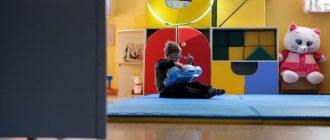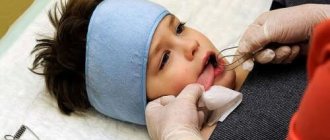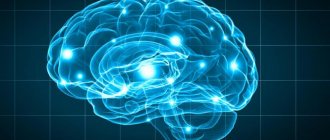Is your child moving from grade two to grade three? Is he unable to learn even a short poem? Does he write with errors, and the entire notebook is filled with red corrections?
If you spend the whole evening doing homework, and the next day your child again gets a D or a C, this does not mean that he is incapable of learning or is pathologically lazy. Most often, the reason lies in the insufficient formation of higher mental functions and immaturity of brain structures. A specialist called a neuropsychologist will help the child in this situation.
What does neuropsychology do?
This section of medicine and psychology studies the relationship between the functioning of the brain and behavior, the human psyche. In other words, a neuropsychologist is a doctor who can objectively assess the state of higher mental functions and help restore them (if they are lost due to severe injury or illness) or develop them when necessary.
The characteristics of brain development are individual for each person. Of great importance is how pregnancy and childbirth, early childhood proceeded, whether severe infections or injuries were suffered, whether developmental activities were appropriate for the child’s age, etc. A neuropsychologist identifies the strengths and weaknesses of the brain in order to bring them to the same level and do the work both hemispheres are more harmonious and productive.
Since a pediatrician evaluates the development and behavior of a child from the point of view of the laws of brain development, higher mental functions and personality and uses specific diagnostic methods, he can identify serious diseases at an early stage and develop the most effective correction program or formative education, taking into account individual characteristics baby.
How can a neuropsychologist help?
A neuropsychologist for children will help correct the following problems:
- Psychomotor and speech development disorders, lack of skills;
- Learning difficulties: restlessness, difficulty absorbing information, problems concentrating;
- Behavioral disorders: aggression, shyness, withdrawal;
- Difficulties in adapting to a team, problems with communication;
- Persistent difficulties in learning and communication.
If your child has a hard time learning and adapting to school, we suggest you familiarize yourself with the principles of neurotraining in our article.
The first stage will be to determine the causes of the child’s difficulties, the second will be the development and implementation of a treatment and correction program.
Consultation with a pediatric neuropsychologist is recommended for the following diagnoses:
- mental retardation (mental retardation);
- ADHD (attention deficit hyperactivity disorder);
- Autism spectrum disorders;
- Sensorimotor alalia, dysarthria, dyslexia, dysgraphia;
- Cerebral palsy (cerebral palsy);
- Perinatal lesions, concussions or brain injuries, history of neuroinfections.
Neurorehabilitation helps achieve significant improvements in these conditions. Many disorders can be effectively corrected using a neuropsychological approach, which considers the physiology of the brain and the functioning of the psyche as a whole.
In what cases should you contact a pediatric neuropsychologist?
Most often, functional immaturity of brain structures in a neurologically healthy child manifests itself in the following situations:
- an age crisis sets in;
- education begins in kindergarten, school;
- mental or emotional stress increases sharply.
The situation is aggravated by stress or a difficult life situation, for example, parental divorce, loss of a close relative, moving to another city, etc. Functional immaturity of brain structures often occurs due to the fact that children at an early age are overloaded with “developmental activities.” It happens that a three-year-old toddler goes to Chinese, and to music, and to the theater. The result is the same thing that happens when a high-rise building is built on a weak foundation: it collapses.
Parents are surprised why a child who is formally fully ready for learning, that is, able to read, count, and write, begins to behave badly, receive unsatisfactory grades, and experiences difficulties in being in a group. Most parents begin to turn to tutors for help or punish their child, when in fact the real reason lies not in the child’s laziness, but in the lack of a solid “foundation” for successful learning.
It is necessary to show the child to a pediatric neuropsychologist in the following cases:
- the baby cannot control himself, “does not hear” the comments of adults;
- his behavior is explosive, impulsive;
- he is characterized by hyperactivity or excessive slowness;
- poorly coordinates his actions, does not orient himself in space, and over the age of 6 years does not know where right and left are;
- The child has illegible handwriting, he confuses the spelling of similar letters, mixes unvoiced and voiced sounds, writes “mirror”;
- cannot identify the main features of an object: color, size, weight, shape, purpose);
- he doesn’t remember the material well, and therefore studying is difficult for him;
- he is not able to independently complete a task in class or at home;
- the child gets tired quickly, is easily distracted, has difficulty concentrating on a task;
- he “does not see” the line, does not understand the simplest formulations of tasks, does not know how to perform actions according to a given algorithm;
- has difficulty mastering reading, writing, and counting.
In addition, the help of a neuropsychologist is necessary if the child has been studying with a speech therapist for a long time with practically zero results, or if he has a developmental delay - mental, speech, mental, psycho-speech.
Why does a child need a neuropsychologist?
: Reading time:
Psychologist, Candidate of Psychological Sciences Irina Anatolyevna Salnikova tells when a child needs to be shown to a neuropsychologist and how he can help.
What does neuropsychology do and who is a neuropsychologist?
Neuropsychology is a science at the intersection of psychology (higher mental functions) and medicine (physiological processes and diseases in the human body). She studies how the brain works and functions and how this affects the human (and child) psyche and behavior.
In other words, neuropsychology studies which areas and processes in the brain are responsible for higher mental functions: perception, memory, attention, thinking, speech.
A neuropsychologist is a clinical psychologist who can evaluate these functions and help them develop better or recover.
Who seeks help from a neuropsychologist? What help can he provide?
Any adult or child over 3 years old can become a client of a neuropsychologist. The brain of each person develops individually and has both strong (resource) and weak (deficient) sides, which do not always lead to pathological changes in higher mental functions, but can affect the productivity of activity.
The main task of a neuropsychologist is to identify the strengths and weaknesses of the brain and bring them into balance. For example, a child does not learn educational material well, and the psychologist finds out that his visual memory is well developed. The child can then use visual cues to do better in school.
How is neuropsychological diagnosis performed?
Be sure to do it in a quiet, well-ventilated room, so that there are no distractions, with sufficient lighting, at the table. The psychologist uses special tools.
Diagnostics consists of tasks that reveal the characteristics of attention, memory, perception, thinking, speech, spatial perception, interhemispheric interaction, hand-eye coordination, level of control and self-regulation of the subject.
Many tasks can be assessed quantitatively (how many points a child’s skill has developed). This is necessary not to compare children with each other, but to monitor the development of the child himself (how many points were a year ago, how many are now). For example, to study memory and attention we use the “Remember 10 words” task.
What problems should you consult a neuropsychologist for?
Neuropsychology was developed for the rehabilitation of people with local brain lesions (after stroke, traumatic brain injury). Now neuropsychologists work a lot with children, since the child’s brain is more plastic - if there are difficulties, they can be quickly overcome, the brain quickly adapts.
The help of a neuropsychologist is necessary when a child:
- “can’t hear” adults;
- cannot control himself, is impulsive;
- hyperactive or excessively slow;
- confuses right and left hands (at 6 years and older);
- writes “mirror” (confuses which way the letters “b” - “d”, “z” - “e” go);
- has been studying with a speech therapist for more than a year, but the results are minimal;
- does not highlight the essential features of an object (color, shape, size, purpose);
- has learning difficulties;
- poor memory;
- inattention, easy distractibility and inability to concentrate;
- difficulties in mastering writing, reading, and counting;
- fast fatiguability;
- developmental delay;
- Difficulties in independently completing schoolwork and homework.
What is treatment in neuropsychology?
Treatment in neuropsychology is called neurocorrection. Neurocorrection consists of two parts: motor (resembles physical therapy) and cognitive (resembles a session with a speech therapist or speech pathologist). Neurocorrection does not require drugs.
By including motor and cognitive (mental) exercises in the neurocorrection program, we work with all skills at once. Exercises “restructure” the functioning of the brain so that the child becomes more diligent and attentive, makes fewer mistakes when reading or writing, and his memory and motor skills improve. Immature areas of the brain develop, and functions that were not there at all often appear - as soon as the neuropsychologist selects the right task.
For example, I had a 7-year-old boy. His parents were worried about his hyperactivity, restlessness, and poor behavior and performance at school. After a course of neurocorrection, the child became calmer, could control and restrain himself, and voluntary attention appeared, which significantly influenced his success at school.
How long does the course of neurocorrection last?
This depends on the diagnostic results: what disorders the psychologist identified in the child and how strong they are. The specialist individually develops a training program, since the course goes from simple to complex exercises, and each child has his own “simple” and “complex” exercises, depending on his strengths and weaknesses.
On average, in order to “start” the processes in the brain in the right direction, you need to exercise for at least six months, 2 times a week and with regular home workouts. I do not recommend quitting classes before the end - then the “perestroika” that has begun will remain unfinished, the problems may return and even become more serious.
During neurocorrection, parents should be prepared for the fact that development does not always occur only in the direction of progress; temporary deterioration may also be observed. This is normal, the brain gets tired and resists change. The main thing is not to give up classes at this crisis stage, be patient and tune in to the result.
At what age is it better to bring a child to a neuropsychologist?
The most productive neuropsychological classes are for children from 5 to 12 years old. At this age, the brain is already sufficiently formed for the child to master and develop skills, but at the same time it is still plastic to easily adapt.
Children's -
Pustylnikova Olga Olegovna, Clinical psychologist, neuropsychologist, defectologist
If you need help from an experienced specialist, make an appointment with Olga Olegova.
Make an appointment
Neuropsychological correction
Neuropsychological correction is of a purely individual nature. The training regimen is selected after a thorough diagnosis and detailed study of the results obtained.
Systematic sessions with a pediatric neuropsychologist make it possible to influence the development of the baby.
Through games, a set of motor exercises and a specially structured course of classes, the active development of higher mental functions occurs. Over time, the child gains the ability to control mental activity, his visual and auditory perception is formed, and previously identified disorders of mental functions are corrected. It is important to follow all the neuropsychologist’s instructions and work with the child at home, because this will not only help to achieve faster results, but will also strengthen trusting relationships in the family.
Reasons for contacting a specialist
To determine whether a child needs a neuropsychologist, it is necessary to analyze which aspects of his behavior are causing concern. The reasons for contacting a specialist are:
- The feeling that you can’t cope with the child. There is a fear that the baby is behind in development, and this cannot be changed by parental efforts alone. Or he has difficulty communicating with peers. Parents are concerned about the presence of obsessive actions in the child: he cannot be at rest, rocks, bites nails, pencils, etc.
- The child’s inability to master a bicycle, scooter, unbalanced gait, frequent falls. He can't decide on his dominant hand.
- Complaints from caregivers or teachers about absent-mindedness. Teachers treat their students objectively, so they notice what passes by the parents’ consciousness. In such cases, it is necessary to establish the root cause of the complaints, which is what the neuropsychologist does during the consultation.
You should consult a specialist if there are too many grievances, stresses, and fears in your child’s life. Excessive passion for tablets, computers and other gadgets to the detriment of communication with peers should be alarming. And the absolute reason for contacting a neuropsychologist is aphasia (speech disorder).
The development of attention and memory with a neuropsychologist is easier and more effective than with parents.
Neuropsychology methods
Neuropsychological methods are selected taking into account specific tasks and the focus of diagnostic or therapeutic measures.
In order to assess neuropsychological syndromes, the Moscow Association of Neuropsychologists recommends using the most common and successful system - Luria, which allows you to diagnose and describe significant mental losses in cases of damage to certain areas of the brain:
- a clinical case is documented (with a description of the medical history, results of instrumental and laboratory tests);
- the mental state of the patient is described with an emphasis on the characteristics of his consciousness, ability to navigate in space and time, criticality and emotional status;
- voluntary and passive attention is studied;
- the emotional background of the patient is studied;
- the features of visual perception are explored (using real objects, letters, numbers, colors, contour drawings);
- the patient’s tactile perception is examined (he recognizes objects by feeling or touching);
- auditory perception is studied in various situations;
- motor activity, coordination of movement, the ability to reproduce certain poses and copy movements are examined;
- Speech skills are examined (the patient’s ability to understand speech, repeat sounds and words, create logical and grammatical structures);
- the features of writing are analyzed;
- Reading, memory, counting system, and intellectual processes are studied.
In recent years, innovative developments based on the modernization of well-known techniques and the introduction of advanced instrumental research into practice have been added to the “piggy bank” of neuropsychology methods.
Neuropsychological research is aimed not only at identifying disorders of brain activity, but also at recognizing its pathogenetic mechanisms.
Make an appointment
Neuropsychological examination by a pediatric neuropsychologist
Diagnosis of developmental disorders is carried out by a pediatric neuropsychologist in accordance with the following stages:
- study of functional brain disorders;
- determining the characteristics of physical development;
- testing the level of mental development of the child;
- study of emotional manifestations;
- studying the presence of pathologies in the functional asymmetry of the cerebral hemispheres;
- study of motor characteristics;
- diagnostics of visual and spatial orientation, ability to recognize objects;
- study of the level of development of speech and memory, determination of the level of intelligence, reading and writing skills;
- assessment of right-handedness and left-handedness.
Such a comprehensive diagnosis takes a lot of time and requires special skills. Approximate duration of examination of children depending on age:
- children under 7 years of age - from 60 to 90 minutes;
- children aged 7 years - up to 90 minutes;
- Children over 10-12 years old can undergo examination for about 1.5 hours.
It is this approach that allows us to assess the level of development of all mental functions of a particular child and their combination. This makes it possible to make a correct diagnosis, as well as create a correction program that will restore development without overloading the child, and also taking into account the combination of all individual indicators.
Neuropsychological diagnostics by a pediatric neuropsychologist are carried out individually. For this purpose, the center has a separate office, where there are no distracting sounds or strangers, which helps to concentrate. The center’s specialists create a calm and friendly environment that will not be an additional stressor. Children are communicated in simple and understandable language, short phrases and simple words are used, which helps any child understand instructions and follow them correctly. All children under 10 years of age are examined in a playful way.
A pediatric neuropsychologist begins his work with diagnostics.
This is a special procedure using diagnostic tests and techniques, during which the connection is revealed between the level of development of mental processes and the state of certain areas of the brain. Based on the diagnostic results, an individual correction program is drawn up, structured in such a way that the so-called weak links are strengthened at the expense of the strong links.
Correctional classes consist of a set of motor and cognitive exercises, selected solely based on the child’s developmental characteristics. Neuropsychological correction is carried out according to the “method of replacement ontogenesis” by A.V. Semenovich.











